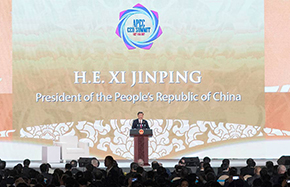Financial sector reforms get a shot in the arm
 |
|
Billionaire actress Zhao Wei and her husband Huang Youlong have been banned from China's securities markets for five years for market violations [Photo/VCG] |
Last week, securities regulators barred billionaire actress Zhao Wei and her husband from trading in the mainland stock market and also imposed fines on them, because there were irregularities in the disclosure they made in their bid to take over a company. And on Wednesday, the Financial Stability and Development Committee of the State Council, established in July, held its first meeting.
The two moves reflect that curbing risks in China's $40 trillion financial sector is high on the priority agenda of the authorities amid the increasingly intertwined business among banks, securities, brokerages, asset managers and insurers.
Since the 18th Party Congress in 2012, the Chinese leadership has led the historic transformation of the financial market, marked by its rapid growth, diversified financial products, more inclusive financial services, orderly advancing of financial reform, a more comprehensive financial system, progress in the yuan's internationalization and the plugging of regulatory loopholes.
In recent years, direct financing has been playing a bigger role in the financial sector: it has optimized the structure of indirect financing, and thus lowered the financing cost of the real economy. An inclusive financial system has been established to provide more tailored services for small and micro-sized businesses, farmers and rural areas, and help poverty alleviation and green development. And the People's Bank of China, the central bank, has reduced the targeted reserve requirement ratio to encourage inclusive financing by commercial banks, such as credit support for small and micro-sized enterprises.
Following the principle of serving the real economy, the construction of multi-level capital market has advanced progressively to facilitate the transformation and upgrading of the economic structure.
Containing financial risks, especially systemic risks, is another core task the central leadership has undertaken in the past five years, and they have implemented a series of measures to strengthen regulation coordination and plug the regulatory loopholes.
Also, of late, the public has become more familiar with the concept of "gray rhinos"-obvious dangers, including in the financial sector, which are often ignored. Experts once said the real estate bubble and local government debt are potential future "gray rhinos". But the continuity and stability of the policies have been improved with the establishment of a long-term mechanism for curbing the property bubble and local government debt risks.
The central bank has continued with its prudent monetary policy with timely adjustments for the past five years, facilitating economic growth and supply-side structural reform. By adopting appropriate measures like open market operation and medium-term lending facilities, it has sustained the steady and healthy development of the banking industry.
Deepening reforms will accelerate the financial sector's development, and the optimization of the financial institution system and modern financial corporations will increase its vitality. Also, the opening up of the financial sector has accelerated since the 18th Party Congress. And the exchange rate mechanism has gradually advanced, pushing forward the yuan's internationalization.
The China-proposed Belt and Road Initiative, which would help further open up China's financial sector, is already yielding results. The increasing acceptability of the yuan in the international market has further promoted the internationalizing of China's currency, not only reducing the country's foreign exchange risks but also deepening regional financial cooperation. The use of the yuan to calculate more cross-border financing products can help provide comprehensive services, and promote pricing, liquidation and financing, which in turn could help it become an international reserve currency.
By helping establish the Asian Infrastructure Investment Bank and the Silk Road Fund, China can now play an increasingly important role in the international financial sector and thus improve global economic governance to ensure that emerging markets get their rightful say in both international and regional financial sectors.
The author is a research fellow at the International Monetary Institute, Renmin University of China, and deputy general manager of fixed income department, Changjiang Securities.
























